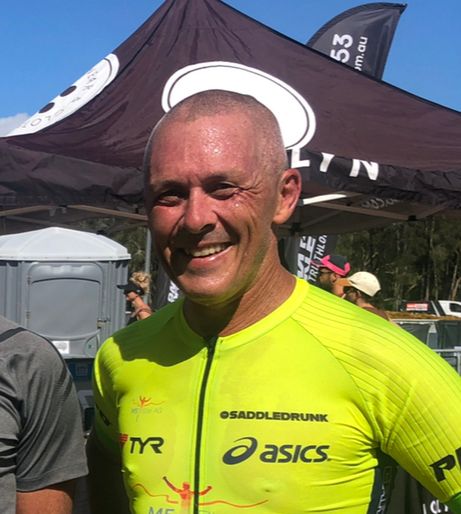Depression: Awareness is Key. Are you OK?



Depression is the leading cause of disability worldwide, yet still leads a silent existence. Most find depression extremely difficult to talk about, thus don’t. The social stigma attached to the leading type of mental illness means more often than not, those suffering fail to receive the treatment they so very much need. In Australia, in any one year, around 1 million Australian adults suffer from depression. That’s 1 in 5 people that will experience a serious bout of depression or anxiety requiring treatment.

The news of Jackie Fairweather’s (nee Gallagher) death on Monday rocked the triathlon and running community worldwide. Jackie was a champion athlete, a former World Champion triathlete (1996), duathlete (1996 and 1999), and a Commonwealth Games bronze medalist in the marathon, in Manchester (2002). Outside of her own personal athletic achievements, Jackie was a selfless coach, mentor, media and industry official, not to mention an ambassador for countless athletes in the sports of triathlon, swimming and running. Needless to say, aside from being an incredible athlete, coach and sports administrator, Jackie was an amazing human being, much loved by all whose lives she touched.
The news of a death affects people in a way no other news can. Add to that the fact someone has taken their own life, and the level of shock experienced rises. Raised for reason of uncertainty, and disbelief behind the circumstances having led to the tragedy. The big questions of why, and how? Many will wonder if they could have prevented it? Perhaps these are answers that will never really be known.
We’re all familiar with the feelings of being sad, moody, or low from time to time, however some people experience these feelings intensely, for long periods of time (weeks, months, even years), and sometimes with no apparent reason. Depression affects how people feel about themselves, often losing interest in things that would normally interest them, including life itself.
Whilst depression is a common illness amongst the general population, it’s prevalence amongst the elite athlete population is just as high. You could be forgiven for assuming that the incidence would be lower; surely successful, champion athletes have little to be depressed about. You could also be forgiven for believing that the number of elite athletes suffering depression is growing; in actual fact, awareness is just growing. When a high profile athlete or personality ends their life, news hits the media. When “Joe Blogs” ends their life, it is only their family and friends who are made aware of the tragedy.
Awareness of depression amongst the elite athlete population is also increasing with thanks to athletes speaking out, sharing their story, no longer hiding behind the cloud of darkness. Champion athletes including Ian Thorpe, Amanda Beard, Jelena Dokic, are but a few examples of individuals who have openly admitted to their struggles with depression.
Which raises the question, do the traits that make an individual a successful athlete, also predispose them to depression?
Paul Penna, of Focus Performance Psychology, is a registered Sports Psychologist, having worked with many of Australia’s top sports people and teams. Paul was the Team Sports Psychologist for the Australian Swim Team, working on the 2008 Beijing Olympic Team, the 2006 Melbourne Commonwealth Games Team, as well as the 2004, 2005 and 2007 World Swimming Championship Teams. According to Penna, the question of whether or not an elite athlete’s personality traits predispose them to depression varies from person to person.
“Everybody’s different. There isn’t one formula or set of rules. Although there are personality traits that make someone a good athlete, that also make them susceptible to depression.”
Penna explains,
“Situations, experiences, chance encounters. They all have an impact on performance as an athlete, and an impact on mental health,” Penna said.
Australian tennis star Jelena Dokic is one such example of an elite athlete having suffered with, and eventually, shared her battle with depression.
I dealt with it (depression) for a long time. It was a couple of years that I really had to deal with it. It took a long time, Dokic has been quoted as saying.
Initially, Dokic was in denial about her depression.
It’s something at first that you don’t know what your dealing with. People around you see what is going on,” said Dokic.
This is exactly why awareness of the condition is vital, in order to reduce the rates of suicide as a result of depression. Often those suffering are either too scared, or simply unaware of their problem, to seek help. Mental illness, including depression, comes with a stigma attached, bringing with it self judgement by oneself, and others. People have a fear of being different. Successful athletes may have a fear of appearing weak. A small problem brews away in silence, and over time can grown out of control, often with fatal consequences.
“We have one of the highest rates of suicide in the world. We’ve got a lot going for us as a country, but we also have access to lethal means,” Penna said.
The biggest problem, according to Penna, is in the timing of help being sought.
“When it (depression) gets really bad, they can’t see the forest from the tree’s. Early intervention and acceptance becomes critical.”
Penna suggested seeking help at the earliest possible time.

Recognising the symptoms of depression or anxiety in yourself, or others, and how/where to seek help is critical in the battle against depression.
“There are plenty of very good surveys available online, but they don’t have the sensitivity of understanding an athlete. The discussion, chat to your doctor, talking through the results, is actually more significant,” said Penna.
Athletes, by nature, are the obsessive, compulsive types. Triathlon in particular attracts “type A” personalities. However, when does that obsessiveness and compulsiveness become a threat to an athletes own health?
Penna explains, “There are levels of change within a person that may predispose them to anxiety and depression.”
“Perfectionistic qualities get a hold of athletes, they begin sacrificing many different things to get in another training session. They begin foregoing sleeping, eating, social interaction (to fit in more training). When someone won’t stop on a ride to have a coffee with the group; when an athlete becomes frustrated that the weather has conspired to wash out a training session.”
These examples demonstrate an inability to move on, to adjust. When an individual becomes incredibly perfectionistic, becomes stuck in a routine.
“When it’s no longer about the race, and all about surviving. When the fun is no longer fun, and you spend more time analysing everything, that’s a warning sign,” said Penna.
So if early intervention is key, where exactly should you seek help?

“Don’t wait! See your doctor, chat to your preferred health professional, speak to your coach, talk to a friend, and don’t be scared about talking to a psychologist.”
If you believe you may be suffering from depression or anxiety, or know someone who may be, there is help available.
Suffering depression or anxiety doesn’t make you any less of a person. In fact, admitting you need help is a sign of strength.
Visit Beyond Blue or call 1300 224 636, the Black Dog Institute, visit www.ruok.org.au, or call Lifeline on 131 144.
In Australia, the Australian Psychological Society provides a free service, to assist you in searching for a psychologist to suit your needs. This search can be found here.